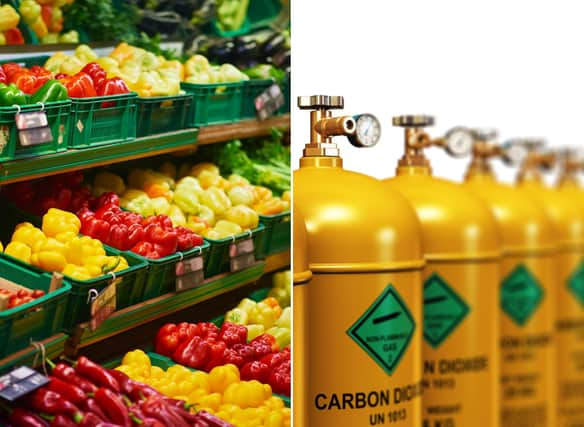What is CO2 used for in the food industry and is there a carbon dioxide shortage in the UK?


The continuing gas crisis in the UK is now revealing itself in fears of food shortages across the country, with limited supplies of carbon dioxide creating additional pressure on food, drink, meat and more industries still struggling in the wake of Brexit.
UK Business Secretary Kwasi Kwarteng announced on Tuesday (21 September) that the UK Government had come to a short term agreement with affected CO2 supplier CF Fertilisers to ensure the supply of carbon dioxide.
Advertisement
Hide AdAdvertisement
Hide AdBut why is the UK facing a CO2 shortage? And why is the food industry set to be the most affected?
Here’s what you need to know.
Why is there a carbon dioxide shortage in the UK?
CF Fertilisers suspended production at its plants in Teesside and Cheshire due to soaring energy costs as global gas prices spiked.
The CO2 produced as a by-product at the plant is vital to the food industry and accounts for around 60% of the UK’s carbon dioxide, according to the UK Government.
But carbon dioxide is also used across a wide range of industries, including the soft drink and hospitality sectors.
Advertisement
Hide AdAdvertisement
Hide AdThe Business Secretary’s agreement reached with CF Fertilisers could see taxpayers pay tens of millions of pounds to subsidise the major US-owned fertiliser manufacturer to ensure the supply of CO2 for the food sector continues amid the energy crisis.
The agreement will be in place for three weeks while the "CO2 market adapts" to the surge in global gas prices, according to the Department for Business, Energy and Industrial Strategy (BEIS).
Environment, Food and Rural Affairs Secretary George Eustice said the final details of the agreement were still being worked on but "it's going to be into many millions, possibly the tens of millions".
What is CO2 used for in the food industry?
CO2 is required in the food industry as part of humane slaughter methods for livestock, with it being used to stun animals in slaughterhouses.
Advertisement
Hide AdAdvertisement
Hide AdBut carbon dioxide is also used to keep packaged products fresh during transit to supermarkets.
A key component in controlled atmosphere storage of fruit and vegetables, carbon dioxide is used in concentrations along with oxygen and nitrogen to regulate the temperature and humidity of food products during storage and transportation.
It is also used to extend the shelf life of dairy and baked products by deterring mould in baked goods and some cheeses, leading to concerns that supermarkets could see less quality produce on their shelves in the coming weeks and potential shortages of some products.
Which other industries could be affected by carbon dioxide shortages?
CO2 is also used in the soft drink and beverage industry to create the carbonated, fizzy alcoholic and non-alcoholic drinks beloved by Brits.
Advertisement
Hide AdAdvertisement
Hide AdA spokesperson for Irn Bru producer AG Barr told The Scotsman said: “We're currently producing to normal schedules.
"However, if the situation worsens across Europe then we could be impacted, but we're taking action to protect normal customer supply as much as possible.
“We have worked hard to build resilience into our CO2 supply chain over a number of years. However, these are quite unprecedented circumstances.”
Healthcare is among the industries most reliant on supplies of CO2, with the colourless and odourless gas deployed during surgery to provide better visibility for surgeons of a surgical area by stabilising body cavities.
Advertisement
Hide AdAdvertisement
Hide AdIt is also used to when freezing off warts, moles and skin tags, as well as for refrigerated transport of medicines and supplies.
Chair of the NHS Confederation Lord Adebowale previously stressed that the UK Government should prioritise “making sure there’s enough CO2 for the NHS” during an appearance on Times Radio.
Lord Adebowale warned that carbon dioxide shortages in the UK could have a huge impact on NHS operations, with surgeries potentially having to be cancelled after considerable delays to and suspensions of operations during the pandemic.
Additional reporting by PA Reporters David Hughes and Patrick Daly
A message from the Editor:
Thank you for reading this article. We're more reliant on your support than ever as the shift in consumer habits brought about by coronavirus impacts our advertisers.
If you haven't already, please consider supporting our trusted, fact-checked journalism by taking out a digital subscription.
Comment Guidelines
National World encourages reader discussion on our stories. User feedback, insights and back-and-forth exchanges add a rich layer of context to reporting. Please review our Community Guidelines before commenting.
